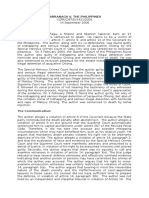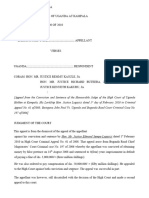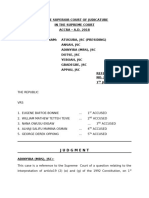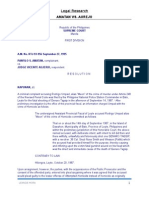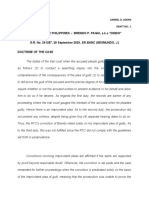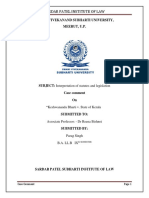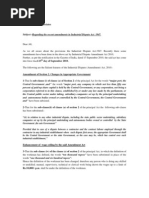0 ratings0% found this document useful (0 votes)
42 viewsBaroy V Phillipines
Baroy V Phillipines
Uploaded by
Vishal SaxenaThe document summarizes a communication submitted to the UN Human Rights Committee regarding Alfredo Baroy, a Philippine national who was sentenced to death at age 17 for rape. Baroy claims violations of his rights under the ICCPR, including being sentenced to death despite evidence he was a minor at the time of the offense. The State argues the case is inadmissible due to failure to exhaust domestic remedies, as the Supreme Court reduced the sentence and Baroy's claim of minority is still pending. Baroy responds that the Supreme Court has shown it will not consider all options, so no adequate domestic remedy remains, making the communication admissible.
Copyright:
© All Rights Reserved
Available Formats
Download as DOCX, PDF, TXT or read online from Scribd
Baroy V Phillipines
Baroy V Phillipines
Uploaded by
Vishal Saxena0 ratings0% found this document useful (0 votes)
42 views4 pagesThe document summarizes a communication submitted to the UN Human Rights Committee regarding Alfredo Baroy, a Philippine national who was sentenced to death at age 17 for rape. Baroy claims violations of his rights under the ICCPR, including being sentenced to death despite evidence he was a minor at the time of the offense. The State argues the case is inadmissible due to failure to exhaust domestic remedies, as the Supreme Court reduced the sentence and Baroy's claim of minority is still pending. Baroy responds that the Supreme Court has shown it will not consider all options, so no adequate domestic remedy remains, making the communication admissible.
Original Title
Baroy v phillipines
Copyright
© © All Rights Reserved
Available Formats
DOCX, PDF, TXT or read online from Scribd
Share this document
Did you find this document useful?
Is this content inappropriate?
The document summarizes a communication submitted to the UN Human Rights Committee regarding Alfredo Baroy, a Philippine national who was sentenced to death at age 17 for rape. Baroy claims violations of his rights under the ICCPR, including being sentenced to death despite evidence he was a minor at the time of the offense. The State argues the case is inadmissible due to failure to exhaust domestic remedies, as the Supreme Court reduced the sentence and Baroy's claim of minority is still pending. Baroy responds that the Supreme Court has shown it will not consider all options, so no adequate domestic remedy remains, making the communication admissible.
Copyright:
© All Rights Reserved
Available Formats
Download as DOCX, PDF, TXT or read online from Scribd
Download as docx, pdf, or txt
0 ratings0% found this document useful (0 votes)
42 views4 pagesBaroy V Phillipines
Baroy V Phillipines
Uploaded by
Vishal SaxenaThe document summarizes a communication submitted to the UN Human Rights Committee regarding Alfredo Baroy, a Philippine national who was sentenced to death at age 17 for rape. Baroy claims violations of his rights under the ICCPR, including being sentenced to death despite evidence he was a minor at the time of the offense. The State argues the case is inadmissible due to failure to exhaust domestic remedies, as the Supreme Court reduced the sentence and Baroy's claim of minority is still pending. Baroy responds that the Supreme Court has shown it will not consider all options, so no adequate domestic remedy remains, making the communication admissible.
Copyright:
© All Rights Reserved
Available Formats
Download as DOCX, PDF, TXT or read online from Scribd
Download as docx, pdf, or txt
You are on page 1of 4
Baroy v.
The Philippines Communication No 1045/2002 31 October 2003 CCPR/C/79/D/1045/2002*
ADMISSIBILITY Submitted by: Mr. Alfredo Baroy (represented by counsel, Mr. Theodore Te) Alleged
victim: The author State party: The Philippines Date of communication: 4 January 2002 (initial
submission) The Human Rights Committee, established under article 28 of the International
Covenant on Civil and Political Rights, Meeting on 31 October 2003, Adopts the following: Decision
on admissibility 1.1 The author of the communication, dated 4 January 2002, is Alfredo Baroy, a
Philippine national allegedly born on 19 January 1984 and thus aged 17 at the time of submission of
the communication. At that time, he was detained on death row at New Bilibid Prisons, Muntinlupa
City. He claims to be a victim of violations by the Philippines of article 6, in particular paragraphs 2, 5
and 6, article 10, paragraph 3, article 14, in particular paragraph 4, and article 26 of the Covenant. He
is represented by counsel. 1.2 On 9 January 2002, the Committee, acting through its Special
Rapporteur on New Communications, pursuant to Rule 86 of the Committee's Rules of Procedure,
requested the State party not to carry out the death sentence against the author, while his case was
under consideration by the Committee. The Special Rapporteur on New Communications further
requested the State party speedily to determine the age of the author and meanwhile to treat him
as a minor, in accordance with the provisions of the Covenant. The facts as presented by the author
2.1 On 2 March 1998, a woman was raped three times. The author and an (adult) coaccused were
thereafter charged with three counts of rape with use of a deadly weapon contrary to article
266A(1),1 in conjunction with article 266B(2), 2 of the Revised Penal Code. It is alleged that on the
date of the offence, the author would have been 14 years, 1 month and 14 days old, by virtue of
being born on 19 January 1984. 2.2 At trial, the defense introduced the issue of minority through the
author, who claimed to have been born in 1982. The trial court instructed the appropriate
government agencies to submit evidence on his true age. Three documents were submitted. A
Certificate of Live Birth listed the date as 19 January 1984, while a Certificate of Late Registration of
Birth showed the date as 19 January 1981, and an Elementary School permanent record as 19
January 1980. The trial court considered, in the light of the author's physical appearance, that the
author's true date of birth was 19 January 1980, thus making him over 18 years of age at the time
the offence was committed. 2.3 On 20 January 1999, the author and his (adult) co-accused were
each convicted of three counts of rape with a deadly weapon and sentenced to death by lethal
injection. In imposing the maximum penalty available, the Court considered that there were the
aggravating circumstances of nighttime and confederation, and no mitigating circumstances. By way
of civil liability, each was further sentenced to pay, in respect of each count, P50,000 in indemnity,
P50,000 in moral damages and P50,000 in civil damages. On 4 January 2002, the communication was
submitted to the Committee. 2.4 On 9 May 2002, the Supreme Court, on automatic review, affirmed
the conviction but reduced the penalty from death to reclusion perpetua, on the basis that no
aggravating circumstances had been sufficiently alleged and proven to exist. On the contrary, the
trial court had overlooked a mitigating circumstance of "accidental" (that is, non-habitual)
intoxication. As to the issue of minority, the Court considered that the record showed that the
author had been coached by his mother to lie about it, and thus, having been "obviously fabricated",
minority had not been made out. 2.5 The author subsequently filed a partial motion for
reconsideration of the 9 May 2002 judgment, reiterating his claim of minority as a privileged
mitigating circumstance. The motion was based on a purported certificate of live birth, certified as a
true copy by the Office of the Civil Registrar General, showing that the author was born on 19
January 1984 (and making him 14 years of age at the time of the commission of the offence). The
complaint 3.1 The author claims to have been a victim of a violation of article 6, paragraph 2, both
alone and in conjunction with paragraph 6. The author explains that following the constitutional
abolition of capital punishment in 1987, the Congress in 1994 reintroduced the death penalty by
electrocution through the Republic Act 7659. This legislation made, inter alia, rape by use of deadly
weapon or by two or more persons, a death-eligible offence (that is, the death penalty was the
maximum penalty but not mandatory).The mode of death was changed to lethal injection and the
range of offences was subsequently expanded by legislation. Up to 2000, seven individuals were
executed. In 2000, the former President imposed a temporary moratorium. No concrete moves to
repeal or review the death penalty were undertaken over this period. In 2001, the current President
revoked the moratorium and announced that executions would resume. The author argues, as a
result, that article 6, paragraph 2, in conjunction with paragraph 6, prohibits the re-imposition of the
death penalty, once abolished. In addition, the offence for which the author was convicted was not a
"most serious crime", as required by article 6, paragraph 2, of the Covenant. 3.2 The author claims a
violation of article 10, paragraph 3, as after his conviction he was detained on death row with other
convicts sentenced to death, regardless of his age. He was not accorded special treatment as a minor
and was detained with adult criminals. 3.3 The author further claims a violation of article 14, in
particular paragraph 4. He was not accorded a separate procedure that would protect his rights
considering his legal status as a minor. No preliminary determination was made as to his minority,
with the trial court simply placing the burden of proof on the defence. Despite evidence from State
authorities that the author was either born in 1981 or 1984, in either case making him a minor at the
time of commission of the offence, the trial court arbitrarily determined his birth year as 1980, thus
making him 18 years at the time of the offence. 3.4 The author finally claims a violation of article 26,
in that his age was arbitrarily determined to be 18, despite evidence of his birth being either in 1981
or 1984. The trial court refused to treat him as a minor and singled him out with the intention of
arbitrarily determining the year of his birth, contrary to the evidence presented. 3.5 By way of relief,
the author petitioned the Committee to request, through interim measures of protection, the State
party speedily to determine his age and urgently to transfer to an appropriate facility, consistent
with his status as a minor, until he reached majority. As to issues on the merits, he requested the
Committee to declare (i) his three death sentences, imposed upon a minor at time of commission of
the offences, to be contrary to article 6, paragraph 5, (ii) his detention on death row, as a minor,
without regard to his legal status as such, to be contrary to article 10, paragraph 3, (iii) the failure to
consider his legal status as a minor during the trial to be contrary to article 14, paragraph 4, and (iv)
the re-imposition of capital punishment and the declared policy of the President to carry it out to be
contrary to article 6, paragraph 2, in conjunction with paragraph 6. He petitioned the Committee to
request the State party to take all appropriate action on the death sentences imposed upon him,
consistent with its own laws on juvenile offenders and its obligations under the Covenant. The State
party's submissions on admissibility and merits 4.1 By Note verbale of 9 July 2002, the State party
contested the admissibility of the communication. The State party argues that, as the author's
appeal was pending before the Supreme Court at the time of submission of the communication, his
complaints were "by and large speculative and premature" and the communication was inadmissible
for failure to exhaust domestic remedies. 4.2 In addition, the State party argues that the Supreme
Court's decision of 9 May 2002 "can very well result in the case before the HRC being considered
moot". The Court, for reasons other than alleged minority, reduced the sentence to reclusion
perpetua. For that reason, the claims with respect to the validity of the death penalty law should be
deemed moot. It also rejected the claim of minority, finding it "obviously fabricated" as a result of
his mother's coaching. The State party points out that as the author subsequently filed a partial
motion for reconsideration of the 9 May 2002 judgment, reiterating his claim of minority as a
privileged mitigating circumstance, the claim continues to be pending and should be dismissed for
non-exhaustion of domestic remedies. The author's comments 5.1 By letter of 26 May 2003, the
author rejected the State party's arguments, arguing that while a partial motion for reconsideration
on the issue of minority is pending, the communication remains admissible because the Supreme
Court's affirmation of the author's guilt and its failure to treat him as a minor, despite the
documentary evidence presented, demonstrates that all domestic remedies have been exhausted.
He submits that a remedy is not "meaningful" unless the tribunal in question is open to considering
all the options. In the author's view, the fact that the Supreme Court has remained steadfast to
reviewing cases based solely on the trial records presented, even in cases where a clear factual
dispute is raised, shows that there is no adequate remedy left. Accordingly, the submission of the
communication was not premature and should be deemed admissible. Supplementary submissions
by the parties 6.1 On 16 July 2003, the State party made additional submissions on the admissibility
and the merits of the communication. As to admissibility, the State party argues, in addition to its
earlier arguments, that the author cannot claim to be a "victim", as required by the Optional
Protocol, as there has been no concrete application of law to his detriment. Indeed, as the 9 May
2002 decision of the Supreme Court reduced the imposed penalty to reclusion perpetua, the death
penalty will not be imposed regardless of the author's age at the time of the offence. 6.2 As to the
merits, the State party argues that the alleged violations are also premised on the author being a
minor. The State party argues that the author's minority has not yet been satisfactorily proven, and
refers to the brief of the Office of the Solicitor- General filed in response to the author's partial
motion for reconsideration before the Supreme Court. In the brief, the Office considers itself "not in
a position to state whether the certificate of live birth attached … is authentic or not", and leaves the
matter to the "sound judgment" of the court. In any event, the Supreme Court has already rejected
the author's claim of minority, which finding stands until such time as the Supreme Court reverses it.
6.3 On the question of the re-imposition of the death penalty in Republic Act 7659, the State party
refers to the jurisprudence of its Supreme Court that the Constitution provides for re-imposition by
Congress, and further that the Act was "replete with both procedural and substantive safeguards
that ensure only [its] correct application".3 In addition, the Court held that the punishment of death
is not, per se, cruel, within the meaning of the State party's constitution. The State party also refers
to the Committee's jurisprudence for the proposition that the death penalty per se is not in violation
of the Covenant.4 6.4 As to the contention that the author should have received a specialized
procedure for minors, the State party observes that the Supreme Court noted the trial courts
findings of deviousness and criminal propensity on the part of the author. The State party argues
that as the trial court's observations should be given weight in view of its first hand assessment of
the author, application of any "special procedure", even if he was a minor, would "clearly be
prejudicial to the administration of justice". 6.5 On the question of the treatment and segregation of
juvenile convicts, the State party refers to the provisions of its Child and Youth Welfare Code
(Presidential Decree 603), as interpreted by the Supreme Court. Under this regime, an offender aged
over 9 and under 15 years of age at the time of commission of an offence is, in the event of a finding
of guilt, not convicted but rather committed to welfare custody. If, however, the offender was aged
below 18 years at the time of commission of the offence but is no longer a minor at the time of trial
and conviction, such a suspended sentence is unavailable. 6.6 As to whether the author's age had
been arbitrarily determined, the State party recalls the authors conflicting statements to the trial
court, where he stated alternately that he was 17 years old and later that he could not recall his age
but had been instructed by his mother to say 17 years. As a result and in light of his appearance, the
trial court solicited official documentation, which it considered before reaching a conclusion that the
author was not a minor. This finding was not reversed in the Supreme Court and remains so until
such time as the Court should decide otherwise. 7.1 The author did not take the opportunity
afforded to him to make additional comments in response to the State party's supplementary
submissions. Issues and proceedings before the Committee Consideration of admissibility 8.1 Before
considering any claim contained in a communication, the Human Rights Committee must, in
accordance with rule 87 of its rules of procedure, decide whether or not it is admissible under the
Optional Protocol to the Covenant. 8.2 The Committee observes that, subsequent to the submission
of the communication, the Supreme Court allowed the author's appeal and substituted a term of
imprisonment in place of the sentence of death. In this respect, the Committee considers that the
issues raised by the author concerning the alleged violations of article 6 of the Covenant through
imposition of the death penalty in his case have become moot, in relation to article 1 of the Optional
Protocol. Accordingly, while potentially relevant to the Committee's assessment of the remaining
claims, these particular issues need not be further addressed by the Committee. 8.3 Inspite of this
conclusion with respect to the claims under article 6, the Committee observes that sentencing a
person to death and placing him or her on death row in circumstances where his or her minority has
not been finally determined raises serious issues under articles 10 and 14, as well as potentially
under article 7, of the Covenant. The Committee observes, however, with respect to the exhaustion
of domestic remedies, that the author has filed a "partial motion for reconsideration", currently
pending before the Supreme Court, requesting the Court to reconsider its treatment of his minority
in its judgment of 9 May 2002. The Committee recalls that its position in relation to issues of
exhaustion of domestic remedies is that, absent exceptional circumstances, this aspect of a
registered communication is to be assessed at the time of its consideration of the case. In the
present case, accordingly, the Committee considers that the questions of the authors' age and the
means by which it was determined by the courts are, by the author's own action, currently before a
judicial forum with authority to resolve definitively these particular claims. It follows that issues
arising under articles 10 and 14 and, potentially, article 7 from the author's age and the manner in
which the courts sought to determine this question are inadmissible, for failure to exhaust domestic
remedies. 9. The Committee therefore decides: (a) That the communication is inadmissible under
articles 1 and 5, paragraph 2(b), of the Optional Protocol; (b) That this decision shall be
communicated to the author and to the State party.
You might also like
- La Bruja y La Santa The Wich and The SaintDocument128 pagesLa Bruja y La Santa The Wich and The Saintsebastian100% (4)
- Midterm Exam StatconDocument4 pagesMidterm Exam Statconlhemnaval100% (6)
- MCQs CRPCDocument7 pagesMCQs CRPCVishal SaxenaNo ratings yet
- Baroy V The Philippines, Case No. 1045-2002Document6 pagesBaroy V The Philippines, Case No. 1045-2002RenzNo ratings yet
- Human Rights Chapter VII CasesDocument48 pagesHuman Rights Chapter VII CasesVic RabayaNo ratings yet
- Human Rights Case DigestsDocument9 pagesHuman Rights Case DigestsEduard Loberez ReyesNo ratings yet
- Baroy V Philippines PDFDocument1 pageBaroy V Philippines PDFAvatar KimNo ratings yet
- Baroy V PhilippinesDocument1 pageBaroy V PhilippinesinvictusincNo ratings yet
- Human Rights PiandongDocument10 pagesHuman Rights PiandongMark Hiro NakagawaNo ratings yet
- Larranaga V PhilippinesDocument3 pagesLarranaga V PhilippinesinvictusincNo ratings yet
- Ramil Rayos v. Philippines PDFDocument14 pagesRamil Rayos v. Philippines PDFcg__95No ratings yet
- Human Rights Case DigestsDocument19 pagesHuman Rights Case DigestsEduard Loberez ReyesNo ratings yet
- Fair Trial 2Document7 pagesFair Trial 2adwoabaah60No ratings yet
- Bughartz v. SwitzerlandDocument12 pagesBughartz v. SwitzerlandAnonymous ZXUO1k3sNo ratings yet
- 690 - Ratiani v. GeorgiaDocument10 pages690 - Ratiani v. GeorgiaNari ZhonzholadzeNo ratings yet
- Alfredo Baroy vs. The PhilippinesDocument2 pagesAlfredo Baroy vs. The PhilippinesSheena Yunzal Garidan-GrazaNo ratings yet
- Judgment of The Court: 6th May & 28th June 2024Document13 pagesJudgment of The Court: 6th May & 28th June 2024KELVIN A JOHNNo ratings yet
- Criminal CaseDocument12 pagesCriminal CaseYUSTO HABIYENo ratings yet
- HRL DigestDocument10 pagesHRL DigestAnonymous BBs1xxk96VNo ratings yet
- Ammany Construction Company Limited Vs Makudo Engineering Company Limited Two Others (Civil Case No 32 of 2023) 2024 TZHC 895 (15 March 2024) 2Document9 pagesAmmany Construction Company Limited Vs Makudo Engineering Company Limited Two Others (Civil Case No 32 of 2023) 2024 TZHC 895 (15 March 2024) 2Mambo JoshuaNo ratings yet
- Failure To Consider Submissions Are Not Evidence, ReDocument24 pagesFailure To Consider Submissions Are Not Evidence, ReMatojo CosattaNo ratings yet
- Piandiong V PhilippinesDocument2 pagesPiandiong V Philippinesinvictusinc100% (2)
- 2020 TZHC 4469Document7 pages2020 TZHC 4469MuddyNo ratings yet
- 6967 2019 1 1502 35850 Judgement 13-May-2022Document22 pages6967 2019 1 1502 35850 Judgement 13-May-2022akshaykumar.legal95No ratings yet
- MD, Mendez - Whoever is Named by a Woman as Being Responsible for Her Pregnancy, Must Be the Father of the Child, Failure to Consider Grounds of Appeal, MATHIAS JOSEPHDocument6 pagesMD, Mendez - Whoever is Named by a Woman as Being Responsible for Her Pregnancy, Must Be the Father of the Child, Failure to Consider Grounds of Appeal, MATHIAS JOSEPHJAPHET s CHARLESNo ratings yet
- Lumanog V PhilippinesDocument3 pagesLumanog V PhilippinesinvictusincNo ratings yet
- Baigana V Uganda (Criminal Appeal No 8 of 2010) 2016 UGCA 1 (25 May 2016)Document10 pagesBaigana V Uganda (Criminal Appeal No 8 of 2010) 2016 UGCA 1 (25 May 2016)HIGENYI TIMOTHYNo ratings yet
- Bernat Vs Sandiganbayan GR No. 158018, May 20, 2004Document2 pagesBernat Vs Sandiganbayan GR No. 158018, May 20, 2004Kastin SantosNo ratings yet
- Kurowski v. Poland FactsDocument5 pagesKurowski v. Poland FactsKvyn HonoridezNo ratings yet
- MD, Mendez - Own Plea of Guilty, No Appeal Lies, PASKALI KAMARADocument14 pagesMD, Mendez - Own Plea of Guilty, No Appeal Lies, PASKALI KAMARAIsaya J ElishaNo ratings yet
- 1815 2008 Adonis v. The Philippines v21Document2 pages1815 2008 Adonis v. The Philippines v21Alex M TabuacNo ratings yet
- Lubuto v Zambia 2Document7 pagesLubuto v Zambia 2Mada BandaNo ratings yet
- Sholam Weiss V AustriaDocument15 pagesSholam Weiss V AustriaDerek J McKnightNo ratings yet
- POP Vs Ang Cho Kio Propabor No Habla EspanolDocument6 pagesPOP Vs Ang Cho Kio Propabor No Habla EspanolKeith Jasper MierNo ratings yet
- CompilationDocument21 pagesCompilationCedric Glenn PurificacionNo ratings yet
- Case of Emonet and Others v. SwitzerlandDocument19 pagesCase of Emonet and Others v. SwitzerlandCatalina MuscaliucNo ratings yet
- Republic Vrs Baffoebonnie and Others 2018 GHASC 40 (7 June 2018)Document31 pagesRepublic Vrs Baffoebonnie and Others 2018 GHASC 40 (7 June 2018)Erasmus Elorm AgboNo ratings yet
- 05 G.R. No. 103119 - Intod v. Court of AppealsDocument8 pages05 G.R. No. 103119 - Intod v. Court of Appealsrosseanne.mendiolaNo ratings yet
- Shabu Marijuana JurisDocument6 pagesShabu Marijuana JurislhyrhaNo ratings yet
- Criminal Appeal 19 of 2018Document4 pagesCriminal Appeal 19 of 2018meldricksakaniNo ratings yet
- Chitat NG Vs CanadaDocument15 pagesChitat NG Vs Canadalegine ramaylaNo ratings yet
- Amatan vs. AurejoDocument5 pagesAmatan vs. AurejoAnatheaAcabanNo ratings yet
- Day 10 - Millado Dan 2Document14 pagesDay 10 - Millado Dan 2Dan R. MilladoNo ratings yet
- MD, Mendez - Constitutionality of Death Penalty, Res Judicata in Public InterestDocument32 pagesMD, Mendez - Constitutionality of Death Penalty, Res Judicata in Public InterestPrince Mwailwa SmithNo ratings yet
- 2022LHC6868Document20 pages2022LHC6868WaqasSanaNo ratings yet
- 248 SCRA 511 Amatan Vs AujeroDocument2 pages248 SCRA 511 Amatan Vs AujeroNikko SterlingNo ratings yet
- Witness Cannot Be Added As An Accused Even If His Statements Are Inculpatory: Supreme CourtDocument36 pagesWitness Cannot Be Added As An Accused Even If His Statements Are Inculpatory: Supreme CourtLive Law100% (2)
- REMEDIAL LAW - People v. Pagal - AdoraDocument17 pagesREMEDIAL LAW - People v. Pagal - AdoraGabriel AdoraNo ratings yet
- G.R. No. 149453 April 1, 2003 Case DigestDocument3 pagesG.R. No. 149453 April 1, 2003 Case DigestDyez Belle0% (1)
- G. R. No. 45220, September 18, 1936Document4 pagesG. R. No. 45220, September 18, 1936MATANG PilipinoNo ratings yet
- Pratap Singh Vs State of JharkhandDocument3 pagesPratap Singh Vs State of JharkhandAparna KadianNo ratings yet
- R V Lutepo (Criminal Case 2 of 2014) 2020 MWHC 23 (16 July 2020)Document34 pagesR V Lutepo (Criminal Case 2 of 2014) 2020 MWHC 23 (16 July 2020)Onesimo LapozoNo ratings yet
- Jebra Kambole Vs The Attoney General (Civil Appeal 236 of 2019) 2022 TZCA 377 (15 June 2022)Document32 pagesJebra Kambole Vs The Attoney General (Civil Appeal 236 of 2019) 2022 TZCA 377 (15 June 2022)minalally234No ratings yet
- Criminal Appeal 5 of 2020Document10 pagesCriminal Appeal 5 of 2020joshkalehNo ratings yet
- Galina Youbko V BelarusDocument7 pagesGalina Youbko V BelaruskuimbaeNo ratings yet
- Anthony Nogueira v. United States, 683 F.2d 576, 1st Cir. (1982)Document10 pagesAnthony Nogueira v. United States, 683 F.2d 576, 1st Cir. (1982)Scribd Government DocsNo ratings yet
- Magige Marwa Mwita and 2 Others Vs Republic 2024 TZCA 994 (28 October 2024) - 1Document10 pagesMagige Marwa Mwita and 2 Others Vs Republic 2024 TZCA 994 (28 October 2024) - 1isihakaibrahim64No ratings yet
- People vs. RiveraDocument5 pagesPeople vs. RiveraIyaNo ratings yet
- Calo Vs DegamoDocument3 pagesCalo Vs DegamoFrancess Mae AlonzoNo ratings yet
- Borg Vs MaltaDocument45 pagesBorg Vs MaltaJoe GattNo ratings yet
- Judgement of The Court: 07 & 13th December, 2023Document15 pagesJudgement of The Court: 07 & 13th December, 2023jaulanetworkNo ratings yet
- The Nuremberg Trials (V. 2): Trial Proceedings From Preliminary Hearing Held on 14 November 1945 to 30 November 1945From EverandThe Nuremberg Trials (V. 2): Trial Proceedings From Preliminary Hearing Held on 14 November 1945 to 30 November 1945No ratings yet
- To Whomsoever It May Concern: HCL-TECH/HRD/2019Document1 pageTo Whomsoever It May Concern: HCL-TECH/HRD/2019Vishal SaxenaNo ratings yet
- Swami Vivekanand Subharti University, Meerut, U.P.: Macelods Pharmaceuticals Ltd. V. Tidal Laboratories P. LTDDocument13 pagesSwami Vivekanand Subharti University, Meerut, U.P.: Macelods Pharmaceuticals Ltd. V. Tidal Laboratories P. LTDVishal SaxenaNo ratings yet
- To Whomsoever It May Concern: HCL-TECH/HRD/2019Document1 pageTo Whomsoever It May Concern: HCL-TECH/HRD/2019Vishal SaxenaNo ratings yet
- SVSU Land Law RMDocument11 pagesSVSU Land Law RMVishal SaxenaNo ratings yet
- Case Comment Bharat Tyagi For Reena Ma'amDocument13 pagesCase Comment Bharat Tyagi For Reena Ma'amVishal SaxenaNo ratings yet
- Case Memorial of Contract LawDocument14 pagesCase Memorial of Contract LawVishal SaxenaNo ratings yet
- To Whomsoever It May Concern: HCL-TECH/HRD/2019Document1 pageTo Whomsoever It May Concern: HCL-TECH/HRD/2019Vishal SaxenaNo ratings yet
- Project (Ravi Saxena) 2 PDFDocument11 pagesProject (Ravi Saxena) 2 PDFVishal SaxenaNo ratings yet
- Miss. Afreen Almas ..VSDocument15 pagesMiss. Afreen Almas ..VSVishal SaxenaNo ratings yet
- Land Law, Parag SinghDocument14 pagesLand Law, Parag SinghVishal SaxenaNo ratings yet
- Parag RIGHTS AND LIABLITIES OF BENEFICIARIES UNDER TRUSTDocument18 pagesParag RIGHTS AND LIABLITIES OF BENEFICIARIES UNDER TRUSTVishal Saxena100% (1)
- SVSU Iprs, Parag Singh PDFDocument13 pagesSVSU Iprs, Parag Singh PDFVishal SaxenaNo ratings yet
- Proverbs of The 21st CenturyDocument9 pagesProverbs of The 21st CenturyVishal SaxenaNo ratings yet
- Project (Ravi Saxena) 2Document11 pagesProject (Ravi Saxena) 2Vishal SaxenaNo ratings yet
- Parag Singh EQUITYDocument15 pagesParag Singh EQUITYVishal SaxenaNo ratings yet
- Project (Ravi Saxena)Document19 pagesProject (Ravi Saxena)Vishal SaxenaNo ratings yet
- Case Comment On Interpretation, Parag SinghDocument18 pagesCase Comment On Interpretation, Parag SinghVishal SaxenaNo ratings yet
- Oath of OfficeDocument2 pagesOath of Office51f1No ratings yet
- Barba v. Liceo de Cagayan University - G.R. No. 193857 - November 28, 2012 - VILLARAMA, JR., JDocument3 pagesBarba v. Liceo de Cagayan University - G.R. No. 193857 - November 28, 2012 - VILLARAMA, JR., JVianca MiguelNo ratings yet
- STP BookDocument3 pagesSTP Bookapi-320546284No ratings yet
- Defamation Legal NoticeDocument5 pagesDefamation Legal NoticeA67% (3)
- Mind MapsDocument4 pagesMind MapsGiannaNo ratings yet
- Entrant Status Check Web SiteDocument2 pagesEntrant Status Check Web SitePase ramadhanNo ratings yet
- 185426Document4 pages185426panduranganraghuramaNo ratings yet
- Rotex GP SpecDocument1 pageRotex GP SpecRosa's TrainingNo ratings yet
- Claim Statement Form - Lender Borrower Group: Policy DetailsDocument1 pageClaim Statement Form - Lender Borrower Group: Policy DetailsShivNo ratings yet
- Newyork Convention On Enforcement of Foreign AwardsDocument3 pagesNewyork Convention On Enforcement of Foreign AwardsVeeresh SangolliNo ratings yet
- Renalyn Manarpiis Reading and Writing Text and Context ConnectionsDocument8 pagesRenalyn Manarpiis Reading and Writing Text and Context ConnectionsJocelyn CalasagNo ratings yet
- Grady Wallace - WikipediaDocument7 pagesGrady Wallace - WikipediabNo ratings yet
- Ilocos RegionDocument2 pagesIlocos RegionJhenalyn PerladaNo ratings yet
- Vargas Vs LangcayDocument2 pagesVargas Vs Langcaypja_14No ratings yet
- Introduction LetterDocument2 pagesIntroduction LetterAjit YadavNo ratings yet
- Press CouncilDocument12 pagesPress CouncilSahad MNo ratings yet
- Google Fires Its EmployeeDocument4 pagesGoogle Fires Its EmployeeKajal VarshneyNo ratings yet
- Recent Amendment in Industrial Dispute Act, 1947Document4 pagesRecent Amendment in Industrial Dispute Act, 1947RAMESHWAR100% (1)
- Anupam Mittal V Westbridge II InvestmentHoldingsDocument4 pagesAnupam Mittal V Westbridge II InvestmentHoldingsSakthi NathanNo ratings yet
- English First Day After The War Analysis SecondaryDocument2 pagesEnglish First Day After The War Analysis SecondarybuhleruleniNo ratings yet
- Eden University Dress CodeDocument2 pagesEden University Dress Codeetafura20No ratings yet
- Final Project HRDocument23 pagesFinal Project HRratna supriyaNo ratings yet
- Miranda vs. AguirreDocument13 pagesMiranda vs. AguirreLaila Ismael SalisaNo ratings yet
- CMS Pahlavan: Caspian Marine Services LTDDocument3 pagesCMS Pahlavan: Caspian Marine Services LTDКонстантин ДNo ratings yet
- Child Labour, Reality, Challenges and Policies - A Case Study in Dibrugarh Town, AssamDocument11 pagesChild Labour, Reality, Challenges and Policies - A Case Study in Dibrugarh Town, AssamMohd ShayaanNo ratings yet
- Flyers 222 New NP RHS4A With DirectionDocument2 pagesFlyers 222 New NP RHS4A With DirectionRcsu CalabarzonNo ratings yet
- Reso Approving POPSPDocument4 pagesReso Approving POPSPpawuskampamapun2023No ratings yet
- CritiqueDocument3 pagesCritiqueChristine Dela CruzNo ratings yet
- York County Election FilingsDocument50 pagesYork County Election FilingsPennLive100% (1)









